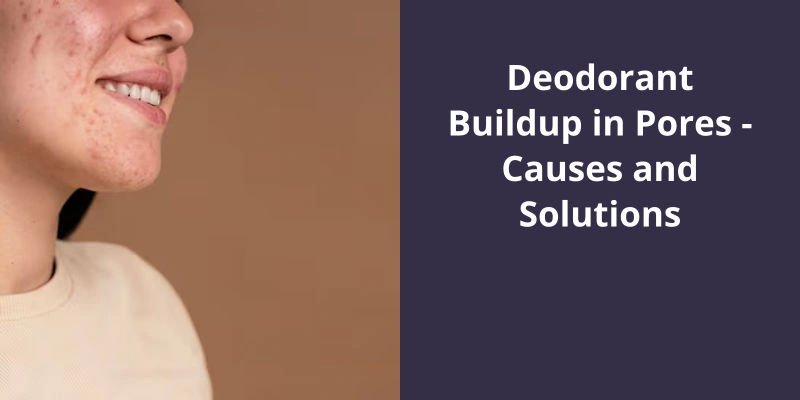Deodorant buildup in pores happens when remnants of deodorant products get trapped in the pores of your skin, often as a result of not properly washing or exfoliating. This can lead to irritating skin issues such as inflammation and acne. To prevent this, it’s crucial to bathe regularly and thoroughly clean the area where you apply deodorant. Using a gentle scrub or pore cleansing tool can help remove any lingering product. Additionally, opting for natural or non-comedogenic deodorants can help, as they are specifically designed not to clog pores. If the buildup gets severe, it might be beneficial to consult with a dermatologist for professional treatment options.

Can Deodorant Build Up in Armpit Pores?
The buildup can cause the pores to become blocked, preventing sweat from being released. This can also lead to inflammation and irritation of the skin, resulting in redness, itching, and discomfort. In severe cases, the blocked pores can even lead to bacterial infections that necessitate medical attention.
One way to prevent the buildup of deodorant in the armpit is to switch to a natural deodorant that’s free from aluminum and other harsh chemicals that can clog pores. Another way is to exfoliate the armpit area regularly to help remove any buildup that may be present. This can be done through gentle scrubbing with a loofah or using an exfoliating product specifically designed for the underarm region.
It’s also important to remember that excessive sweating can exacerbate the problem of deodorant buildup in the armpit. Therefore, it’s crucial to maintain good hygiene by washing the underarm area thoroughly and frequently, especially after working out or engaging in any activity that causes excessive sweating.
Your doctor may prescribe topical treatments to help alleviate any symptoms of inflammation or infection, or they may recommend more drastic treatments such as laser therapy to help unclog the pores.
However, there are several preventive measures that one can take to avoid this problem, such as switching to a natural deodorant, exfoliating regularly, and maintaining good hygiene. Seeking medical attention is also crucial if symptoms of inflammation or infection persist. By following these guidelines, you can keep your armpits healthy and odor-free.
What Are the Long-Term Effects of Using Deodorant With Harsh Chemicals on the Skin, Besides Clogging Pores?
Deodorants with harsh chemicals can have long-term effects on the skin including dryness, irritation, and inflammation. Additionally, some chemicals in deodorants have been linked to cancer and hormonal imbalances. It’s important to choose natural or organic deodorants to avoid these potential risks.
Understanding how deodorant and antiperspirants work is crucial in taking care of our personal hygiene. Many people wonder about the effects of these products on their skin, particularly whether or not deodorant goes into their pores. To shed some light on the subject, medical experts have provided some insightful information on the matter.
Does Deodorant Go Into Your Pores?
There have been a lot of discussions and debates on whether or not deodorant goes into the pores. The truth is that the answer is a bit more complicated than a simple yes or no.
Firstly, it’s important to understand that there are two main types of underarm products: deodorant and antiperspirant. Deodorants work by masking body odor with fragrances, while antiperspirants contain aluminum salts that block sweat from leaving the body. The mechanism through which these products work determines how they interact with the pores.
They don’t contain any pore-clogging ingredients, and therefore don’t penetrate deep into the pores. As a result, deodorants are generally considered safe for all skin types and don’t pose any serious health risks.
On the other hand, antiperspirants work by temporarily blocking sweat ducts to prevent sweat from reaching the surface of the skin. The aluminum salts in antiperspirants form a gel-like plug that sits in the top layer of the skin and clogs the pores, preventing sweat from escaping. While effective at controlling sweat, some people are concerned about the potential health risks associated with clogged pores.
While there’s ongoing research into the potential health risks of using antiperspirants, there’s currently no definitive evidence to suggest that they’re harmful. However, some people may experience skin irritation or allergic reactions to the aluminum salts or other ingredients found in antiperspirants. If you’ve sensitive skin, switching to a natural deodorant or antiperspirant may be a better option.
If you’re concerned about the health risks associated with antiperspirants, switching to a natural deodorant may be a good option for you. Ultimately, it’s important to choose the underarm product that works best for your individual needs and preferences.
The Ingredients Commonly Found in Deodorants and Antiperspirants
- Aluminum compounds
- Triclosan
- Parabens
- Propylene glycol
- Fragrance
- Talc
- Silica
- Stearates
- Alcohol
- BHT
Source: Does continues use of deodorant on underarms block …
However, it’s not just aluminium that can cause breakouts. There are several other factors that can contribute to irritated skin or acne when using deodorants. In this article, we will explore some of the reasons why certain deodorants may not be agreeing with your skin and what you can do about it.
Why Do Some Deodorants Make Me Break Out?
However, it’s important to note that not all deodorants contain aluminum, and there are alternative options available. Some deodorants use natural ingredients such as essential oils and baking soda to combat odor without clogging pores. These options may be better suited for those with sensitive skin or who’re prone to breakouts.
Aside from aluminum, other ingredients commonly found in deodorants such as fragrances, preservatives, and alcohol can also be irritating to the skin. These ingredients can disrupt the natural pH balance of the skin and cause inflammation or redness. It’s important to read the ingredient list and choose a deodorant that’s free of potential irritants.
Another factor that may contribute to breakouts is the frequency of application. Applying deodorant too often or overusing it can lead to clogged pores and irritation. It’s recommended to apply deodorant once a day and allow the product to fully dry before getting dressed.
In addition to choosing the right deodorant, maintaining good hygiene practices can also help prevent breakouts. Showering regularly, exfoliating the underarm area, and avoiding tight-fitting clothing can all help prevent sweat buildup and bacteria growth.
If breakouts persist despite these efforts, it may be helpful to consult a dermatologist. They can provide personalized recommendations and advice for managing underarm acne and irritation.
How to Switch to Natural Deodorants and What to Expect
- Start by reading the ingredients on your current deodorant to identify any harsh chemicals.
- Look for natural deodorants that use ingredients like baking soda, arrowroot powder, and essential oils.
- Expect a transition period where your body adjusts to the new deodorant. You may experience more sweat or odor in the first few weeks.
- Gently exfoliate your underarms to remove any buildup from your previous deodorant and improve the effectiveness of your natural deodorant.
- Consider reapplying the deodorant throughout the day if needed, as natural formulas may not provide 24-hour protection.
- Be patient and give your body time to adjust to the switch to natural deodorant.
Not only is natural deodorant effective at controlling odors without blocking pores, but it also contains beneficial ingredients that promote healthy skin. Let’s take a closer look at some popular natural deodorants on the market to see which ones are worth trying.
Does Natural Deodorant Block Pores?
Additionally, the use of natural deodorants can help reduce the occurrence of skin irritation, rashes and inflammation, which are usually caused by chemicals present in conventional deodorants. Since natural deodorants are free of harmful chemicals such as aluminum, parabens and phthalates, they’re gentler on the skin and less likely to cause adverse reactions.
One other advantage of natural deodorants is that they don’t stain clothes. The use of conventional deodorants often leaves yellow stains on white clothes or discoloration on dark apparel. This is mainly due to the ingredients present in the products such as aluminum and petroleum that when mixed with sweat, produce stains. Natural deodorants, on the other hand, don’t contain these chemicals, making them more gentle on clothes.
While natural deodorants may be more expensive than conventional deodorants, their benefits to the body and the environment make them worth the investment. Generally, natural ingredients are friendlier to the environment and don’t deplete natural resources, making them more sustainable. They also tend to come in eco-friendly packaging, reducing the amount of waste generated.
They’re gentle on the skin, don’t clog pores and inhibit the growth of odor-causing bacteria while preventing unpleasant odours. They’re also free of harsh chemicals that can cause skin irritation and discoloration on clothes.
How to Choose the Best Natural Deodorant for Your Skin Type
When choosing a natural deodorant, it’s important to consider your skin type. Look for ingredients that work well with your skin and avoid potential irritants. Experiment with different formulas and scents to find the one that works for you. Remember, switching to a natural deodorant may require an adjustment period for your body.
Now that we know how deodorant affects sweat glands, it’s important to understand if applying deodorant on sweat is actually harmful or not.
Is It Bad to Put Deodorant on Sweat?
However, when applying deodorant to already sweaty areas, the effectiveness of the product can be diminished. Additionally, the combination of sweat and deodorant can create a breeding ground for bacteria, which can lead to increased odor and potential skin irritation.
Sweat glands serve an important function in regulating body temperature and removing toxins from the body. When these glands become blocked, it can lead to a buildup of toxins and increase the risk of infections.
It’s also important to note that some antiperspirants contain aluminum, which has been linked to health concerns such as breast cancer and Alzheimers disease. While the research on these links is still inconclusive, it’s worth noting that some people may prefer to avoid aluminum-based products.
If you’re experiencing excessive sweating, it may be worth speaking to a healthcare professional about potential treatment options, such as prescription-strength antiperspirants or other medical interventions.
In the meantime, practicing good hygiene habits, such as showering regularly and wearing breathable fabrics, can help to control sweaty odors.
The Difference Between Antiperspirants and Deodorants and How They Work.
- Antiperspirants reduce sweating by blocking sweat glands with aluminum-based ingredients.
- Deodorants mask odor by killing bacteria with antimicrobial ingredients.
- Antiperspirants are more effective for controlling sweat, while deodorants are better for neutralizing odor.
- Some products may have both antiperspirant and deodorant properties.
- Antiperspirants may cause skin irritation or allergic reactions in some people.
- Deodorants are generally considered safe for daily use.
- Choosing between antiperspirants and deodorants ultimately depends on personal preference and needs.
Conclusion
Knowing that this ingredient can form a barrier that traps sweat in pores, leading to buildup and potential irritation, it's important to consider seeking out natural alternatives that don't rely on harsh chemicals. By doing so, we can take care of our bodies while still maintaining our confidence and freshness throughout the day.





